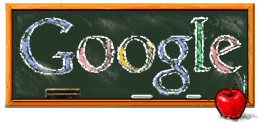Mastering The Googleverse, Part 2
Searching For Images

Part 2 in an an ongoing series of tips and tricks designed to help you and your students improve the way you search. (Previously: Part 1: Searching by Key Phrase)
Looking for a high-quality image of Toni Morrison for a PowerPoint presentation? A detailed Spanish-language map of Mexico City for Spanish class? A map or graph comparing average U.S. wages for men and women?
There are millions of images out there on the web, and sifting through them can take forever without a solid search-and-collect strategy. Here are some tips to get you started on Google Image Search:
- How you plan to use your image should be a key factor in determining your search strategy. If you will be projecting your image on a big screen, for example, you might want to restrict your search by size to large or medium images only.
- Do not take your image from your search engine's search result screen! To speed up your search, Google (or any search engine) only displays a tiny version of the real image in your results. When you click on the image, most search engines then show that same tiny version of the image in a frame atop the page where the image was found. Make sure you take your image from the actual web page, and not the search engine!
- Similarly, many photo sites, like this index of weeds found in New Jersey, only show a smaller version of their best image -- called a thumbnail -- on the page itself. Click on small images before saving, just in case a better quality image opens up!
- Search engines use several criteria, including image name and the surrounding text on a page, to determine the results of your search. To get the best results, do several searches using synonyms before you decide on the perfect image. For example, I get useful but vastly different results for image searches of the terms kitten, kitty, and cat.
- As with any search, using only english terms will only get you images from pages in english. Searching in another language may turn up better results if you're looking for images of and from other countries and cultures. Note, for example, that our map of Mexico City above comes from Google España.
- If you can't find the image you want, don't despair! Google Image Search can only find an image by keyword if the keyword is used with that image in its original page, and not every web page presents their images with your searching needs in mind. Most pages on the web include images; a careful Google search for web pages on the right subject may bring you exactly the right picture. And, of course, if scanning is available in your school, searching for images in the library reference collection is often the best way to get the highest quality pictures for your project or cover page!

0 Comments:
Post a Comment
<< Home